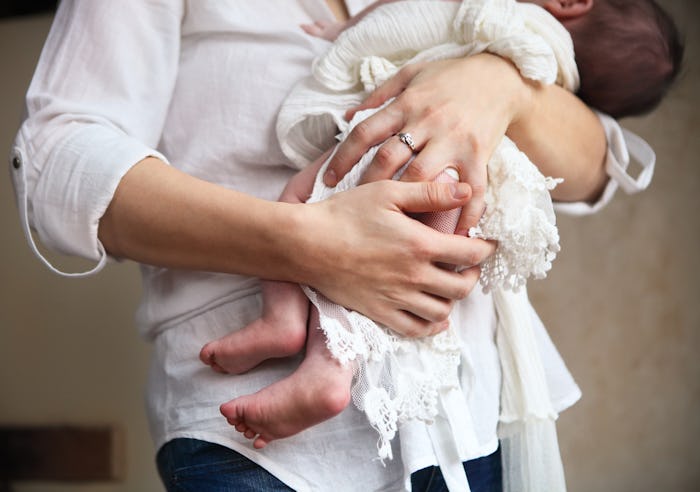My basic mission statement when I gave birth to my daughter was something like, "keep the baby happy and healthy., and try not to cry too much." I didn't follow that last part very well but, in general, I wasn't trying to adhere myself to any kind of parenting style. I just wanted to make it through one day at a time. I think most moms feel that way, even if they do plenty of research on styles like attachment parenting. But there are a few things you didn't know about attachment parenting that could alter your decision, both positively and negatively, to follow any type of parenting style.
I always feel kind of like a jerk when I say that I don't follow the attachment parenting guidelines. I mean, what parent doesn't want to be attached to their child? That's kind of the point of becoming a mother, right? Was I a horrible person for deciding that the attachment parenting style wasn't for me?
Nope. Not even a little bit. Although I understand why people choose to follow attachment parenting guidelines, it wouldn't have worked for me, especially since I was a single mom to my newborn daughter. But if you're on the fence about trying it out or want to know more beyond the basic principles, here are nine things you didn't know about attachment parenting.
1It Can Reduce The Risk Of SIDS
Co-sleeping is a major principle of attachment parenting, despite the American Academy of Pediatrics' warning against it. But according to the Dr. Sears website, attachment parenting can actually reduce the risk of SIDS. The theory is that if all of the attachment parenting principles, like co-sleeping and breastfeeding, are there to regulate your baby's physiological systems and to raise your awareness of your baby and their needs, then the risk of SIDS is reduced.
2It's All About Your Child's Schedule
There's no training or trying to get your baby on a schedule that works for you in attachment parenting. Attachment Parenting International shared the eight principles of attachment parenting and nearly all of them include following your baby's cues and responding accordingly. Some of the suggestions even recommend holding off on business trips or other errands that could keep you away from your child if your little one isn't ready.
3It Advocates For Less Baby Gear
Attachment parenting focuses on a lot of nurturing touch which means baby swings, baby walkers, and even booster seats aren't necessarily recommended. Attachment Parenting International suggested you sparingly use any type of baby equipment or gear as it decreases the amount of time you actually hold and interact with your baby.
4It Advocates Positive Discipline
Discipline is still a big part of attachment parenting, although it definitely doesn't include spanking. Attachment parenting includes disciplining with respect and trying to find a reason for your child's behavior, rather than punishing without looking more into it.
5It Cuts Down On The Decisions You Have To Make
One major benefit to attachment parenting is that it cuts down on the amount of decisions you have to make. You no longer have to worry about whether you should wean your child or get them out of your bed before they are 2 years old. Because attachment parenting is all about following your child's cues, you basically let their growth make the decisions for both of you. When they're ready, they'll let you know and it can make transitions much easier.
6It Is Not Helicopter Parenting
One huge myth of attachment parenting is that it is the same as helicopter parenting, but this isn't true. According to Psychology Today, the difference is that attachment parenting is all about setting a safe, secure ground for your child. They are free to explore and grow, but they know they can always come to you, making them a little more independent than other children.
7It Advocates For Strong Bonds Between Child & Caregiver
Yup, attachment parenting isn't just for parents and babies. Attachment Parenting International suggested finding a caregiver that will become long-term so that your child can develop an attachment to them, receiving the same love and care they get from you, without the constant switching between new and different caregivers.
8Its Roots Began In Orphanage Observations
Attachment parenting is nothing new, but Psychology Today noted that the roots of the practice actually began after World War II during observations at orphanages. Psychiatrists studying the children in orphanages found that because of the separation from their parents, they suffered physically, psychologically, and socially. It wasn't enough to meet their basic needs — caregivers needed to offer touch and nurturing support, too.
9The Behavior Isn't As Important As The Actual Response
As tough as it may sound to follow all of the principles of attachment parenting, it's actually easier than you think. Because the entire point of attachment parenting is to meet your child's needs and respond to their cues so they feel safe, well-loved, and secure, your response is actually more important than the behavior in which you do it. Meaning if you choose to bottle feed instead of breastfeed, your child won't suffer. Attachment parenting finds that it's important to feed your baby based on their hunger cues, no matter how you do it.
